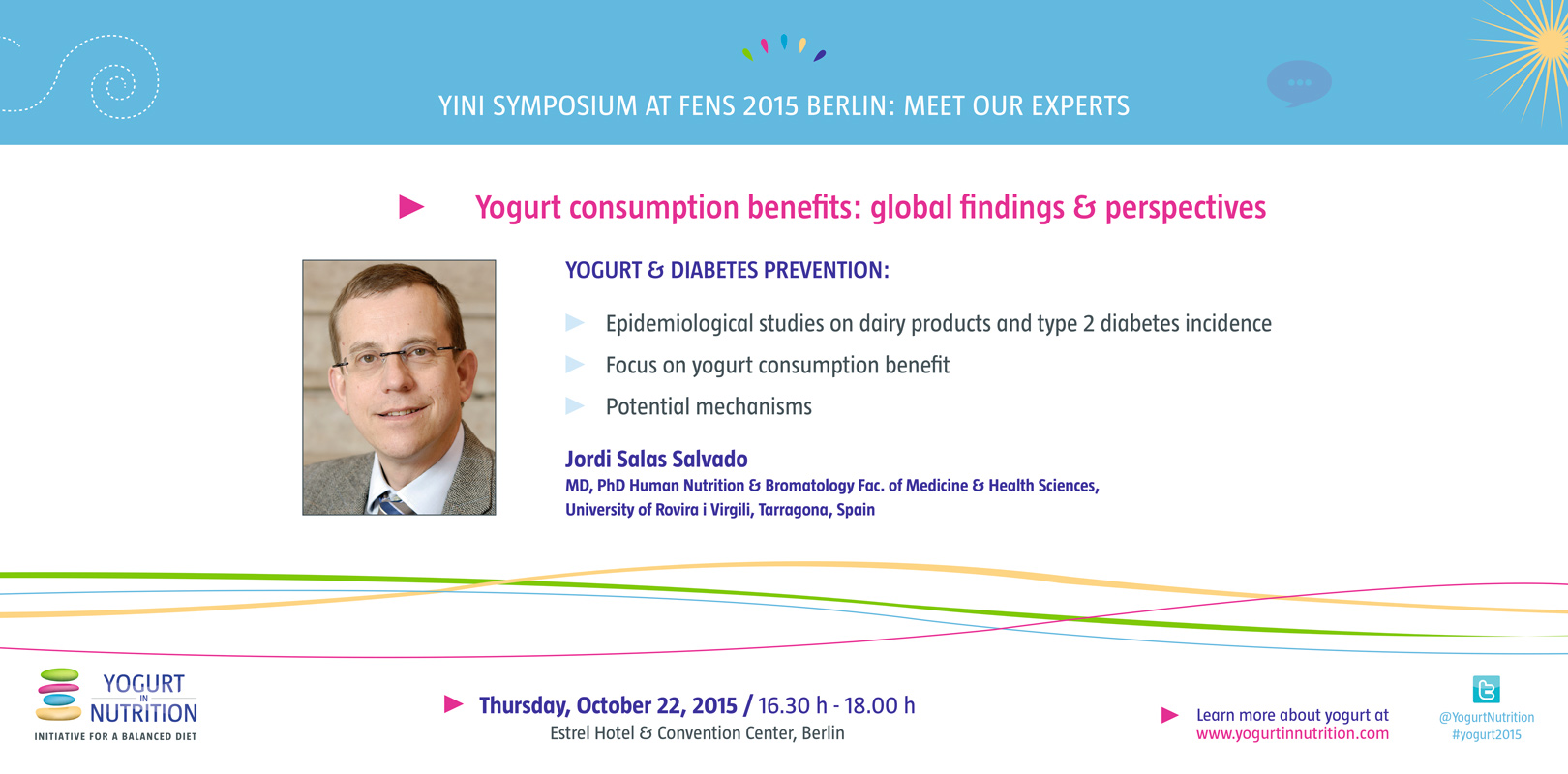Type 2 diabetes is a disease that currently affects some 387 million people worldwide, and is expected to affect 205 millions more by the year 2030 according to International Diabetes Federation. The possible effects of dairy consumption on diabetes prevention remain controversial largely owing to their saturated fat content, which are conventionally perceived as having an adverse impact on health. However, yogurt is a nutrient-dense food and contains high-quality protein, vitamins (A, D, B2, B12), and minerals (calcium, magnesium, and potassium), which have been shown to have beneficial effects on type 2 diabetes risk.
Prospective studies show a decreased risk of diabetes for frequent yogurt consumption.
Dr. Jordi Salas-Salvadó (PhD Human Nutrition at the Faculty of Medicine and Health Sciences, Rovira i Virgili University, Spain) focused in his research on the potential role of dairy consumption in the prevention of type 2 diabetes (T2D). When comparing the risk of developing T2D for each dairy food subtype, scientific data indicated that other forms of dairy, like milk and cheese, did not offer a similar preventive effect as yogurt.
Recent studies found that saturated fatty acids (SFAs) with an odd number of carbon atoms in their chain (15 and 17) were associated with a lower risk of developing type 2 diabetes. Odd-chain SFAs are well-established markers of eating dairy fats, which is consistent with several recent studies that found a protective effect against type 2 diabetes through yogurt and dairy consumption.
Dr Salas reviewed recent published evidence supporting that frequent yogurt intake is consistently and negatively associated with the risk of type 2 diabetes in young as well as middle-aged individuals and that this association was independent of the fat content of the diet.
A healthy dietary pattern incorporating yogurt consumption, may be protective against type 2 diabetes in older adults at high cardiovascular risk.
The study recently published by Jordi Salas-Salvado’s team and performed in older adults at high cardiovascular risk confirms the existing results and namely those of the two most recent studies in that field of research. In US, Chen et al. showed that yogurt consumption was associated with a risk reduction of type 2 Diabetes of 17% and in UK, O’Connor et al showed that yogurt consumption was associated with a larger risk reduction of type 2 diabetes of 28%.
The specificity of the renowned PREDIMED cohort used in this Spanish study enables authors to explore different approaches in terms of dairy consumption habits during the 4 years of follow-up. The results demonstrated that the risk reduction was maintained for both low-fat (32%) and whole fat (34%) yogurt consumption. The increased consumption of total low-fat dairy and total yogurt during the follow-up was also inversely associated with type 2 diabetes risk. Moreover, substituting 1 serving/day of a combination of biscuits/chocolate or whole grain biscuits/homemade pastries for 1 serving/day of yogurt was associated with a 40 and 45% reduction risk, respectively.
Watch now the slideshow from Prof. Jordi Salas-Salvadó:
Check out all sources and read more on the research of Prof. Jordi Salas-Salvadó
References:
-
Chen M, et al. Dairy consumption and risk of type 2 diabetes 3 cohorts of US adults and an updated meta-analysis. BMC Med 2014; 12:215.
-
O’Connor L.M., et al. Dietary dairy product intake and incident type 2 diabetes: a prospective study using dietary data from a 7-day food diary, Diabetologia May 2014, Vol 57(5), pp. 909-17.
-
Díaz-López A, et al. Dairy product consumption and risk of type 2 diabetes in an elderly Spanish Mediterranean population at high cardiovascular risk. Eur J Nutr 2015 Feb 7.



